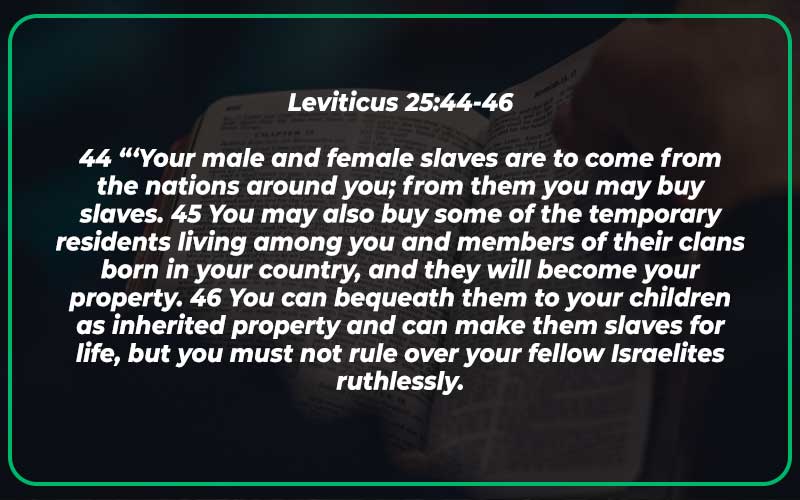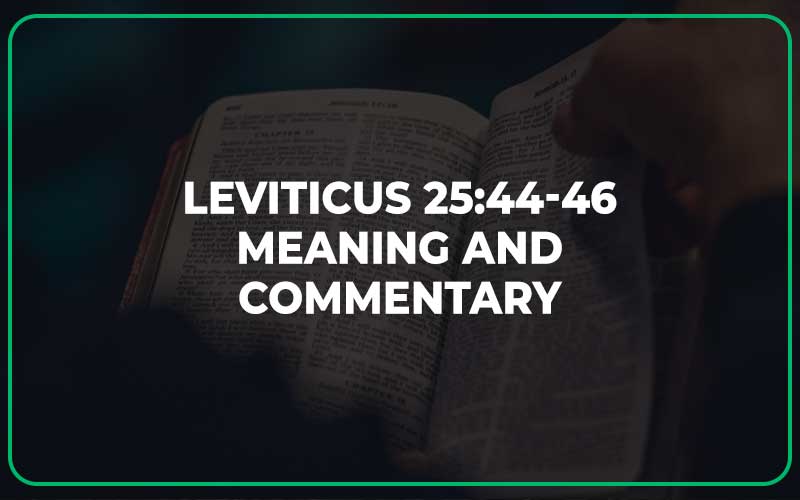Leviticus 25:44-46
44 “‘Your male and female slaves are to come from the nations around you; from them you may buy slaves. 45 You may also buy some of the temporary residents living among you and members of their clans born in your country, and they will become your property. 46 You can bequeath them to your children as inherited property and can make them slaves for life, but you must not rule over your fellow Israelites ruthlessly.
Leviticus 25:44-46 Meaning
In Leviticus 25:44-46, the Bible verses discuss the rules and regulations surrounding the ownership and treatment of slaves in the context of the Israelites. It addresses how slaves could be acquired from the nations surrounding them and emphasizes that they were to be treated as property, passed down to future generations, and could be inherited.
Leviticus 25:44-46 Commentary and Explanation
Leviticus 25:44-46 is a passage that raises several important theological and ethical questions within the context of the Old Testament and its treatment of slavery.
In these verses, the Lord speaks to Moses about the treatment of foreign slaves among the Israelites. We are told that Israelites could possess slaves from the surrounding nations and their descendants as property, and that they could be passed down as an inheritance. At first glance, this might seem troubling to our modern sensibilities, as it appears to condone the ownership of human beings.
However, we must interpret these verses within their historical and cultural context. In the ancient world, slavery was a common practice, and it was often brutal and dehumanizing. The regulations found in the Mosaic Law aimed to provide some level of protection and humane treatment for foreign slaves within Israel.
When we consider Exodus 21:16, which prohibits the kidnapping of individuals to be sold into slavery, we can see that the Bible was concerned with preventing the worst forms of exploitation. Slavery in Israel was often a means for foreigners to find refuge and sustenance within the community, although it still carried a significant power imbalance.
Furthermore, it is important to note that these regulations were given at a time when the Israelites were surrounded by nations that practiced slavery without any such restrictions. In a way, these laws may have represented a more compassionate approach compared to the prevailing practices of the time.
In Leviticus 25:46, we see the concept of inheritance in relation to slaves. This means that foreign slaves could become part of an Israelite household and share in the blessings and responsibilities of the family. While this may not justify the institution of slavery, it does reflect a certain degree of integration and care for the well-being of slaves within Israelite society.
As we continue to explore the Bible, we find verses such as Galatians 3:28, where the apostle Paul teaches that in Christ, there is no distinction between slave and free, male and female, for all are one in Christ Jesus. This verse, among others, underscores the Christian belief in the inherent dignity and worth of every individual, regardless of their social status.
Leviticus 25:44-46 raises complex questions about the morality of slavery in the biblical context. While it is crucial to understand these verses within their historical framework, we should also recognize that the Bible’s teachings evolve towards a more inclusive and compassionate view of human dignity. In the light of New Testament teachings and the message of Christ, we are called to treat all individuals with love, respect, and equality, transcending the social hierarchies of the past.
Also Read: Leviticus 17 Meaning and Commentary
Context of Leviticus 25:44-46
To gain a better understanding of this passage, we need to consider its context within the larger narrative of Leviticus. The book of Leviticus is primarily a guide for the Israelites regarding their relationship with God and how to live in a way that reflects their chosen status as His people. It contains various laws and instructions, including regulations on sacrifices, cleanliness, and ethical conduct.
The section containing Leviticus 25:44-46 focuses on the Year of Jubilee, which was a significant anniversary for the Israelites. During this year, many laws and practices were suspended or modified. However, the laws concerning the acquisition and treatment of slaves remained in effect.

Breaking Down the Key Parts of Leviticus 25:44-46
a) Leviticus 25:44 – The verse states, “Your male and female slaves are to come from the nations around you; from them you may buy slaves.”
This verse acknowledges that the Israelites were permitted to acquire slaves from neighboring nations. However, it is crucial to note that this was not an endorsement of slave trade but a recognition of its existence within their cultural context.
b) Leviticus 25:45 – “You may also buy some of the temporary residents living among you and members of their clans born in your country, and they will become your property.”
This verse extends the permission to acquire slaves to temporary residents or foreigners residing among the Israelites. Again, it reflects the cultural norms of the time rather than a promotion of slavery as a preferred practice.
c) Leviticus 25:46 – “You can bequeath them to your children as inherited property and can make them slaves for life, but you must not rule over your fellow Israelites ruthlessly.”
This verse establishes that acquired slaves could be passed down as inherited property. While this may sound harsh to our modern ears, it was an accepted practice in the ancient world. Additionally, it emphasizes the contrast between the treatment of slaves and the treatment expected of fellow Israelites. The Israelites were to exercise kindness and fairness in their dealings with one another.
Bible Study on Leviticus 25:44-46
When studying these verses, it is crucial to approach them in the light of the entire biblical narrative. Jesus came to fulfill the Law and usher in a new covenant, emphasizing love, mercy, and equality. The New Testament teaches that all believers are one in Christ Jesus, regardless of social status (Galatians 3:28).
While slavery was a reality in biblical times, we are called to follow the teachings of Jesus and treat all individuals with dignity and respect. In our current era, with a better understanding of human rights, we condemn the owning of another person as property.
Final Thoughts
Leviticus 25:44-46 serves as a reminder of the cultural context of the Bible and the progression of God’s plan for humanity. We must approach these verses with discernment, recognizing that they provide instruction on governing societal practices in a specific time and place.
As Christians, our focus should be on living out the principles of love, justice, and compassion taught by Jesus. Slavery, as it was defined in biblical times, should never justify the exploitation or mistreatment of fellow human beings.
Let us seek to understand the historical and cultural background of biblical passages, trusting in the guidance of the Holy Spirit and the teachings of Jesus. As we strive to live according to the principles of the New Covenant, may we actively promote justice, equality, and the inherent worth of every individual.

